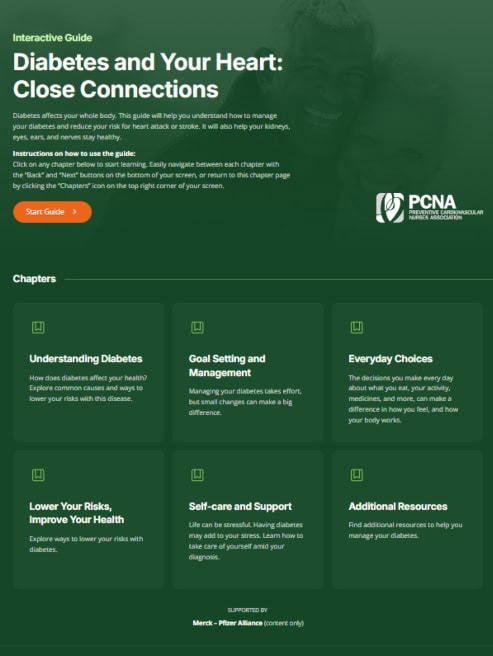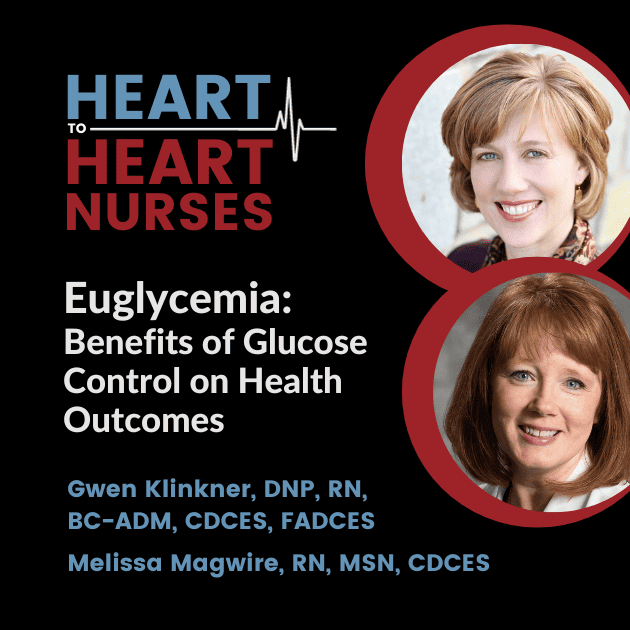Guests Gwen Klinkner, DNP, RN, BC-ADM, CDCES, FADCES, and Melissa Magwire, RN, MSN, CDCES, describe how to help patients with diabetes navigate behavior change principles to achieve glucose management, including nutrition and exercise. They also examine pharmacotherapies for weight loss with glucose-lowering medications.
Earn 0.3 CE contact hours from listening to the podcast episode and completing the course components.
Supported by an independent medical education grant from Novo Nordisk.
Episode Resources
- SURMOUNT Trials
- Association of Diabetes Care and Education Specialists
- Association of glycemia with macrovascular and microvascular complications of type 2 diabetes: doi: 10.1136/bmj.321.7258.405
- Comprehensive Management of Cardiovascular Risk Factors for Adults With Type 2 Diabetes: AHA Scientific Statement: doi:10.1161/CIR.0000000000001040
- Diabetes Self-management Education and Support in Adults With Type 2 Diabetes: A Consensus Report of the ADA, ADCES, AND, AAFP, AAPA, AANP, APhA: doi:10.1177/0145721720930959
Welcome to Heart to Heart Nurses, brought to you by the Preventive Cardiovascular Nurses Association. PCNA’s mission is to promote nurses as leaders in cardiovascular disease prevention and management.
Geralyn Warfield (host): Welcome to our audience to this third of a three-episode miniseries focused on type 2 diabetes, GLP-1s, and cardiovascular disease.
We encourage you to listen to the other two episodes in this particular miniseries for even more information about this topic.
This particular episode is available for CE contact hours. Please make sure to follow the link in the episode show notes to complete your posttest, your evaluation, and access your CE certificate.
In today’s episode, we’ll be discussing the impact of glucose management on health outcomes. And I’m very excited to have our two guests with us today. Gwen Klinker and Melissa McGuire have a lot of great information to share. [00:01:00]
Gwen, could you introduce yourself to us first, please?
Gwen Klinker (guest): Sure. Thanks for having us. I’m Gwen Klinkner. I am a Clinical Nurse Specialist for diabetes and patient family education at the University of Wisconsin Hospital and Clinics. I’ve been in this role for 20 years. And I’m a Certified Diabetes Care and Education Specialist and board certified in Advanced Diabetes Management.
Geralyn Warfield (host): Thank you so much. Melissa, could you please introduce yourself to our audience?
Melissa Magwire (guest): Sure. Hi. Thanks for having me. So, I’m Melissa McGuire. I’m an RN, MSN, CDCES. I currently practice as a clinician in the Haverty Cardiometabolic Center of Excellence here in Kansas City, but I’m also the Program Director for the Cardiometabolic Center Alliance.
Geralyn Warfield (host): Well, thank you both for being here today. I’m sure our audience can recognize already what great information we’re going to be covering with you two today. And just for those listeners who perhaps haven’t listened to the other two episodes, could you please refresh our memories about the connection between glucose management and cardiovascular disease?
Gwen Klinker (guest): [00:02:00] Sure. First, our listeners are probably well aware that diabetes in itself is an independent risk factor for atherosclerotic cardiovascular disease. Stroke, coronary heart disease, peripheral artery disease, and heart failure are all major causes of morbidity and mortality for those with diabetes.
Glycemic management is one aspect, along with blood pressure and lipid management and lifestyle modification, that can reduce risks of complication. One interesting fact is that the risk of MI, stroke, or peripheral artery disease increases 18% for every increase percentage in A1C.
Melissa Magwire (guest): Unfortunately, cardiovascular disease is still the leading cause of morbidity and mortality in those living with type 2 diabetes. And the life expectancy in patients that are age 60 and older living with diabetes is reduced by about 12 years currently.
The flip side to the statistics that Gwen mentioned is [00:03:00] that studies have shown that for each 1% A1C decrease, there’s about a 14% decrease in Mis, and another 37% decrease in microvascular complications.
Geralyn Warfield (host): So, you’ve described for us very well the interconnections between diabetes and cardiovascular disease. And in both disease states, a healthy lifestyle can actually help reduce the risk for disease progression and lead to better patient outcomes.
And we also know that behavior change can be quite challenging for all of us, both as providers and as patients. Gwen, I’m hoping you could first describe for us the effective strategies that might be utilized for behavior change that can help our patients in achieving those behavior change goals.
Gwen Klinker (guest): Sure. One of the most effective strategies I think is to start with a good assessment. Oftentimes people have previous knowledge and experiences and even misconceptions that influence their decisions and priorities. And as clinicians, we need to be [00:04:00] good listeners and to be curious when asking people questions. It can help us uncover beliefs and values and preferences that help us to support the behavior change process.
One of the questions that I use to better understand someone’s priorities is, “What is your biggest concern about living with diabetes?” The answers can really be eye-opening and steer you in a completely different direction than what you expected.
We also need to support people in setting goals. And as clinicians, our goals may be quite different. But we need to remember that diabetes is a self-managed condition and our role is to empower and support. We can help people set small achievable goals and then identify some of those strategies that would help them overcome challenges, and then celebrate successes with them.
This collaborative, person-centered approach really focuses on shared decision-making. And then [00:05:00] last but not least, we need to remember that the words we use can unintentionally just increase feelings of shame and guilt.
So, for example, when we use the term ‘glucose testing,’ it can make a person think about numbers being good or bad, versus using the term ‘glucose monitoring,’ which is more neutral.
And likewise, when we talk about ‘glucose control,’ or ‘good control’ versus’ bad control’,’ It can induce some of those feelings of shame and guilt. Whereas if we just shared what their A1C result was, or their time and range, or just simply stating if they’re meeting their targets or not, that’s a much better approach.
And then we need to avoid labeling someone as their disease. So instead of asking, “Are you diabetic?” put the person first and ask, “How long have you had diabetes?” Using the strengths-based language that puts the person first really helps to [00:06:00] build therapeutic relationships.
Melissa Magwire (guest): Well, and like always, Gwen is spot on. You know, the way to ensure that those living with diabetes are able to navigate challenges is to assist them in creating a plan that’s realistic and meaningful for them personally. You know, by identifying what’s most meaningful to that person who’s living with diabetes rather than overwhelming them with our goals as clinicians and our expectations for their visit, it’s really essential.
I think one of the most impactful workflow steps that we ever instituted in our clinic was to have our medical assistant ask every single patient at the start of every single visit, “What is your biggest concern and what is the topic you want to discuss today?”
Geralyn Warfield (host): I suppose that this kind of patient-centric, person-centered terminology and actions are very well modeled in both of your clinical settings. But it brought to mind to me family situations, and maybe family members are not aware [00:07:00] of how their language, how their attitude towards this particular disease or these diseases can really impact patients.
Do you have any recommendations for the clinicians that are listening to this for how to gently encourage family members or friends to use the same kind of methodology?
Gwen Klinker (guest): Yeah, that’s a great point. And I think we see this day in and day out. I would say the first thing is to just model the new language.
And also, not try to correct people who have diabetes. it’s their preference to say, “I’m a diabetic,” right? And so, it’s not, we shouldn’t try to be the police necessarily, but to kind of reflect back, use language differently. And again, model it so that when we’re having these conversations, people hear it differently and people can, you know…
I’ve had this discussion with nurses about other chronic conditions too, and people oftentimes [00:08:00] don’t even think about it until you bring it up and they’re like, “Oh, yeah, that that is a difference. That makes a difference to me.” So, modeling it for family members and others who are part of the care team is really important.
Melissa Magwire (guest): Definitely, and you know, I sometimes will bring in personal experience. My husband is living with MS. And so, as I sit down to talk to these family members we talk about having, living with a chronic disease. And I’ll say something that modeling to your effect is, “You know, I understand what it’s like to be the caregiver or a support for someone living with a chronic disease,” and I refer to my husband as someone who’s living with MS, not as an MS patient, just like I refer to your loved one as someone living with type 2 diabetes.
So sometimes that messaging can really spark a thought process in that family member.
Geralyn Warfield (host): I really respect the fact that as a healthcare professional in today’s time, you are managing more than just a single individual that you’re seeing in the clinical setting. You are managing the families, the caregivers, the [00:09:00] other healthcare professionals, actually, with whom you are interacting on a regular basis in modeling that behavior.
So, I appreciate the fact that it’s quite complicated sometimes to have folks recognize where we could make some improvements in terms of that language and helping our patients in that regard. Thanks so much for that.
We’ve been talking with Gwen Klinker and Melissa McGuire about behavior change and glucose control. We’re going to take a quick break.
Geralyn Warfield (host): I’d like to welcome our audience back as we continue our discussion about glucose management. We’ve been focused thus far kind of on lifestyle and personal interactions and modeling behaviors and language that can help our patients and families and even our colleagues.
But I’m hoping that we can shift gears just a little bit to talk about options for glucose management that go beyond that lifestyle. And Melissa, could you first please discuss for us related pharmacotherapies that are available for these patients?
Melissa Magwire (guest): Ah, definitely. So, while there have been oral anti-obesity agents on the market for decades, it’s really been [00:10:00] just since about 2014 that we’ve had a class of medications that have addressed both glycemic control and weight loss in one agent.
The GLP-1 class, GLP-1 receptor agonist class of medications was initially brought to market for glycemic control in the setting of type 2 diabetes. And those GLP-1 agents work in a glucose-dependent manner to stimulate endogenous—or your own body’s—insulin release, as well as to decrease glucagon levels in response to glucose levels at the time that you’re intaking food. So, a really good mechanism of a glycemic kind of controlled glucose burden on/off switch.
But they have additional effects as well, besides that glycemic control, and it’s really the slowing of gastric emptying, as well as stimulating GLP-1 receptors in the hypothalamus and the brain. And both of these things lead to a decrease in appetite and a decrease in food intake.
So, currently there are two [00:11:00] GLP-1 agents out on the market. that actually have an indication now for weight loss. While there’s several GLP-1s out there for glycemic control, we have two on the market that currently have indication for weight loss. And they also have significant risk factor decreases for cardiovascular disease.
And there are studies ongoing looking at, you know, those other risk factor decreases that we see with weight loss and glycemic control, such as improvements in AFib and NASH and NAFLD and sleep apnea and many others. And so, the two medications that are currently approved for weight loss have been shown in trials to show anywhere from a 5 to 6% decrease in total body weight loss to a 14 to 15%, depending on which agent and which dose you’re looking at.
And there, you know, currently for glycemic control in the setting of type 2, and not yet approved, is another drug called trizepatide. And it reported out in the SURMOUNT trials anywhere from a [00:12:00] 21 to a 26% decrease in total body weight loss. So, we can see that there’s more potentially coming to the market in this space, and while it does contain GLP-1, it’s actually a dual agonist, trizepatide is, that has GLP-1 and GIP.
So not to get too much in the weeds, but just to let you know that there’s a lot more coming in this space. And really looking at these drugs for a multitude of action, be that glycemic control, weight management, and really taking advantage of these products when they’re approved for weight loss, as well as glycemic control in this setting.
Geralyn Warfield (host): Gwen, is there anything that you would like to add?
Gwen Klinker (guest): Well, Melissa very nicely highlights the evidence around GLP-1 receptor agonists. I would just add that although some other drug classes are not necessarily approved for weight loss, there are some alternatives for those who are, you know, trying to not only achieve their glycemic management goals, but also some weight loss.
So, metformin, for example, is one that, [00:13:00] can obviously cause some weight loss for people. And then a newer drug class, the SGLT2 inhibitors, or sodium glucose cotransporter 2 inhibitors, is another. And, just for clinicians to remember that these multiple choices really help us to individualize treatment.
Geralyn Warfield (host): And are there any resources that you would point either clinicians or their patients towards to learn more about this topic?
Melissa Magwire (guest): Well, I think there’s a multitude out there, and Gwen, you can step in as well. You know, ADCES, PCNA, all of those, and then the professional societies, AHA. For the clinician side, you know, all of the algorithms now that are looking at type 2 management and cardiovascular risk and obesity really can link you out to some nice resources.
For family members as well, you know, going to a reputable site like ADCES or PCNA is usually where I drive my patients to.
Gwen Klinker (guest): That’s very well said. I would encourage the same. Those are excellent [00:14:00] professional resources, but they oftentimes do connect you to patient resources as well. Patient-facing information and resources, so, I agree with those.
Geralyn Warfield (host): Well, thank you so very much to our guests, Gwen Klinker and Melissa Magwire, for joining us today.
And I’d like to remind our audience that this episode is available for CE contact hours. You’ll want to check out the show notes to find the link to the posttest, the evaluation, and be able to access your CE certificate for this program today.
We again also encourage you to listen to the first and third episodes, to listen to all three, honestly. You’ve listened to a third of the three episodes, and we encourage you to listen to the other two to have a full complement of information that you can use in clinical practice.
We’d also like to thank Novo Nordisk for funding support for this podcast episode.
This is your host, Geralyn Warfield, and we will see you next time.
Thank you for listening to Heart to Heart Nurses. We invite you to visit pcna.net for clinical resources, continuing education, and much more.
Topics
- Diabetes
- Lifestyle and Behavior Change
Published on
October 31, 2023
Listen on:
DNP, RN, BC-ADM, CDCES, FADCES

RN, MSN, CDCES
Related Resources


Online Interactive Guides
Diabetes and Your Heart: Close Connections Online Interactive Patient Tool
June 12, 2025

Provider Tools
Guidelines for Managing Cardiovascular Disease Risk in Patients with Diabetes Pocket Guide
January 19, 2025






